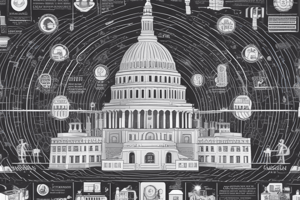Podcast
Questions and Answers
Which scenario best exemplifies the core challenge of balancing efficiency and democratic values in public administration?
Which scenario best exemplifies the core challenge of balancing efficiency and democratic values in public administration?
- A government agency rapidly adopts an AI-powered case management system to process applications, leading to a 25% reduction in processing time and costs, but also resulting in algorithmic biases against certain demographic groups. (correct)
- A state department of education implements a standardized testing program to assess student performance and hold schools accountable, resulting in improved test scores but also narrowing the curriculum and increasing student stress.
- A federal agency outsources its IT services to a private company to reduce costs, leading to greater efficiency but also raising concerns about data security and the potential loss of government control over critical infrastructure.
- A city council delays the implementation of a new waste management system for six months to allow for extensive public hearings and feedback sessions, despite the system promising significant cost savings.
In what critical way does the New Public Service (NPS) paradigm differ from the New Public Management (NPM) approach regarding the role of citizens?
In what critical way does the New Public Service (NPS) paradigm differ from the New Public Management (NPM) approach regarding the role of citizens?
- NPM emphasizes citizen engagement through online platforms and social media, while NPS focuses on traditional methods of public consultation, such as town hall meetings and surveys.
- NPM views citizens as customers whose needs should be met efficiently, while NPS sees citizens as active participants in shaping public policy and governance. (correct)
- NPM encourages citizen involvement in service delivery through volunteer programs, while NPS emphasizes professional expertise and technical competence in public service.
- NPM prioritizes citizen satisfaction as a key performance indicator, while NPS focuses on achieving measurable outcomes related to social equity and environmental sustainability.
Which of the following scenarios most directly demonstrates a challenge arising from globalization for public administration?
Which of the following scenarios most directly demonstrates a challenge arising from globalization for public administration?
- A state agency struggles to implement a new environmental regulation due to resistance from local businesses concerned about increased compliance costs.
- A federal agency faces criticism for its handling of a domestic natural disaster, leading to calls for improved emergency preparedness and response.
- A city government struggles to manage increasing traffic congestion due to population growth and increased urbanization.
- A local government struggles to balance its budget due to declining tax revenues resulting from a decrease in manufacturing jobs caused by international competition. (correct)
How might the principles of systems theory be applied to improve the effectiveness of a public health agency's response to a pandemic?
How might the principles of systems theory be applied to improve the effectiveness of a public health agency's response to a pandemic?
What potential ethical conflict arises when public administrators are encouraged to adopt entrepreneurial approaches and generate revenue for their agencies?
What potential ethical conflict arises when public administrators are encouraged to adopt entrepreneurial approaches and generate revenue for their agencies?
Which of the following scenarios represents the most significant challenge to ensuring accountability in a collaborative governance arrangement involving multiple government agencies, non-profits, and private sector organizations?
Which of the following scenarios represents the most significant challenge to ensuring accountability in a collaborative governance arrangement involving multiple government agencies, non-profits, and private sector organizations?
How does the concept of 'wicked problems' challenge traditional approaches to policy formulation in public administration?
How does the concept of 'wicked problems' challenge traditional approaches to policy formulation in public administration?
Which of the following scenarios best illustrates the application of evidence-based policymaking in public administration?
Which of the following scenarios best illustrates the application of evidence-based policymaking in public administration?
What is the most critical limitation of relying solely on performance measurement to assess the effectiveness of public programs?
What is the most critical limitation of relying solely on performance measurement to assess the effectiveness of public programs?
In what way might digital governance initiatives inadvertently exacerbate existing inequalities in society?
In what way might digital governance initiatives inadvertently exacerbate existing inequalities in society?
How can the principles of ethical leadership be applied to address the challenge of corruption in public administration?
How can the principles of ethical leadership be applied to address the challenge of corruption in public administration?
What is the most significant challenge in applying Max Weber's bureaucracy theory in contemporary public administration?
What is the most significant challenge in applying Max Weber's bureaucracy theory in contemporary public administration?
What critical element distinguishes public administration from business administration in the context of organizational goals?
What critical element distinguishes public administration from business administration in the context of organizational goals?
In the evolution of public administration, how did the Human Relations Era fundamentally challenge the principles of Scientific Management?
In the evolution of public administration, how did the Human Relations Era fundamentally challenge the principles of Scientific Management?
Which of the following scenarios presents the greatest risk of political interference in public administration?
Which of the following scenarios presents the greatest risk of political interference in public administration?
How might a public administrator effectively address the challenge of 'bureaucratic red tape' while still ensuring accountability and transparency?
How might a public administrator effectively address the challenge of 'bureaucratic red tape' while still ensuring accountability and transparency?
In the context of public administration, what distinguishes policy implementation from policy formulation?
In the context of public administration, what distinguishes policy implementation from policy formulation?
Which statement accurately captures the relationship between power and ethics in public administration?
Which statement accurately captures the relationship between power and ethics in public administration?
What critical insight did the Hawthorne experiments provide that significantly influenced the development of the Human Relations Theory in public administration?
What critical insight did the Hawthorne experiments provide that significantly influenced the development of the Human Relations Theory in public administration?
How does the concept of social equity challenge the traditional principles of public administration?
How does the concept of social equity challenge the traditional principles of public administration?
Flashcards
Public Administration
Public Administration
The implementation of government policy and an academic discipline that studies this implementation.
Public Administrators
Public Administrators
Public servants working in public departments and agencies, at all levels of government.
The Early Period (1789-1883)
The Early Period (1789-1883)
A period where government jobs were awarded based on political loyalty rather than merit.
Pendleton Act of 1883
Pendleton Act of 1883
Signup and view all the flashcards
Woodrow Wilson's "The Study of Administration" (1887)
Woodrow Wilson's "The Study of Administration" (1887)
Signup and view all the flashcards
Scientific Management Era (1900-1930s)
Scientific Management Era (1900-1930s)
Signup and view all the flashcards
Human Relations Era (1930s-1950s)
Human Relations Era (1930s-1950s)
Signup and view all the flashcards
New Public Management Era (1980s-2000s)
New Public Management Era (1980s-2000s)
Signup and view all the flashcards
New Public Service Era (2000s-Present)
New Public Service Era (2000s-Present)
Signup and view all the flashcards
Bureaucracy Theory
Bureaucracy Theory
Signup and view all the flashcards
New Public Service (NPS)
New Public Service (NPS)
Signup and view all the flashcards
Policy Formulation
Policy Formulation
Signup and view all the flashcards
Implementation
Implementation
Signup and view all the flashcards
Budgeting
Budgeting
Signup and view all the flashcards
Human Resources
Human Resources
Signup and view all the flashcards
Evaluation
Evaluation
Signup and view all the flashcards
Regulation
Regulation
Signup and view all the flashcards
Service Delivery
Service Delivery
Signup and view all the flashcards
Bureaucratic Red Tape
Bureaucratic Red Tape
Signup and view all the flashcards
Ethical Leadership
Ethical Leadership
Signup and view all the flashcards
Study Notes
- Public administration is the implementation of government policy and an academic discipline that studies this implementation
- It is the process by which governments translate public policies into action
- Public administration is concerned with the organization, policies, theories and programs of the government
- It is often regarded as including also some responsibility for determining the policies and programs of governments
- As a field of study, it is often considered a sub-field of political science and is related to other fields, such as public economics, public law, and urban planning
- Public administration is a broad field that covers a wide range of topics, including:
- Budgeting
- Human resources
- Policy analysis
- Organizational theory
- Public administration is a complex and challenging field, but it is also an essential one for the functioning of modern societies
- It plays a vital role in ensuring that governments are able to provide public services effectively and efficiently
- Public administration can be broadly defined as the development, implementation and study of government policy
- It is often associated with a bureaucracy
- Many nonelected government workers can be considered to be public administrators
- Public administrators are public servants working in public departments and agencies, at all levels of government
- In the U.S., public administration dates back to 1789
- It started with the creation of the Department of State
- The evolution of public administration is marked by several key periods
- These periods are often associated with significant reforms and changes in administrative theory and practice:
- The Early Period (1789-1883)
- Characterized by the "spoils system," where government jobs were awarded based on political loyalty rather than merit
- The focus was on basic administrative tasks such as revenue collection and maintaining order
- The Reform Era (1883-1937)
- Triggered by the Pendleton Act of 1883, which established the Civil Service Commission and introduced merit-based appointments
- Woodrow Wilson's "The Study of Administration" (1887) called for a science of administration, separate from politics
- This era emphasized efficiency and economy in government
- The Scientific Management Era (1900-1930s)
- Influenced by Frederick Taylor's scientific management principles, which sought to improve efficiency through scientific analysis and standardization of work processes
- Focus on time-and-motion studies and optimizing organizational structures
- The Human Relations Era (1930s-1950s)
- The Hawthorne experiments highlighted the importance of social and psychological factors in the workplace
- Emphasis on employee morale, motivation, and participatory management
- The Post-War Era (1950s-1980s)
- Growth of the welfare state and expansion of government programs
- Development of new management techniques, such as systems analysis and program budgeting
- Increased focus on policy analysis and evaluation
- The New Public Management Era (1980s-2000s)
- Influenced by neoliberal ideas, emphasizing market-based solutions and privatization
- Focus on efficiency, accountability, and customer service
- Introduction of performance measurement and contracting out
- The New Public Service Era (2000s-Present)
- Emphasis on citizen engagement, collaboration, and democratic values
- Focus on ethical leadership, social equity, and sustainability
- Recognition of the importance of public service motivation and trust in government
- The Early Period (1789-1883)
- Public administration is influenced by several key theories and approaches:
- Bureaucracy Theory
- Max Weber's concept of bureaucracy emphasizes hierarchy, specialization, and formal rules to ensure efficiency and impartiality
- Scientific Management
- Frederick Taylor's approach focuses on optimizing work processes through scientific analysis and standardization
- Human Relations Theory
- Emphasizes the importance of social and psychological factors in the workplace, such as employee morale and motivation
- Systems Theory
- Views organizations as complex systems with interdependent parts, emphasizing the importance of feedback and adaptation
- New Public Management (NPM)
- Advocates for market-based solutions, privatization, and performance measurement to improve efficiency and accountability
- New Public Service (NPS)
- Focuses on citizen engagement, collaboration, and democratic values in public administration
- Bureaucracy Theory
- Key functions of public administration include:
- Policy Formulation
- Participating in the process of developing and shaping public policies
- Implementation
- Putting policies into action through programs, services, and regulations
- Budgeting
- Managing public finances and allocating resources to achieve policy goals
- Human Resources
- Recruiting, training, and managing public sector employees
- Evaluation
- Assessing the effectiveness and impact of public policies and programs
- Regulation
- Establishing and enforcing rules and standards to protect the public interest
- Service Delivery
- Providing public services, such as education, healthcare, and infrastructure
- Policy Formulation
- Public administration plays a crucial role in contemporary governance by:
- Ensuring Accountability
- Holding public officials and organizations responsible for their actions and decisions
- Promoting Transparency
- Making government processes and information accessible to the public
- Enhancing Efficiency
- Improving the effectiveness and productivity of public services
- Ensuring Equity
- Promoting fairness and equal opportunity in the delivery of public services
- Fostering Citizen Engagement
- Involving citizens in the policy-making process and promoting civic participation
- Responding to Crises
- Managing emergencies and disasters effectively
- Implementing Sustainable Development Goals
- Integrating environmental, social, and economic considerations into public policies and programs
- Ensuring Accountability
- Public administration faces several challenges, including:
- Bureaucratic Red Tape
- Excessive rules and regulations that can hinder efficiency and innovation
- Corruption
- Abuse of public office for private gain
- Lack of Accountability
- Difficulty in holding public officials and organizations responsible for their actions
- Political Interference
- Undue influence of political considerations on administrative decisions
- Capacity Gaps
- Shortage of skilled personnel and resources to address complex policy challenges
- Technological Disruption
- Need to adapt to rapid technological changes and leverage technology to improve public services
- Globalization
- Addressing transnational issues such as climate change, migration, and economic inequality
- Bureaucratic Red Tape
- Current trends in public administration include:
- Digital Governance
- Using technology to improve public services, enhance citizen engagement, and promote transparency
- Evidence-Based Policymaking
- Using data and research to inform policy decisions and improve program effectiveness
- Collaborative Governance
- Involving multiple stakeholders, including government agencies, non-profits, and private sector organizations, in the policy-making process
- Social Innovation
- Developing new solutions to address social and environmental challenges
- Performance Management
- Measuring and monitoring the performance of public programs and organizations to improve outcomes
- Ethical Leadership
- Promoting ethical behavior and integrity in public service
- Public administration is distinct from business administration, although there are some overlaps
- Public administration focuses on serving the public interest and achieving societal goals, while business administration focuses on maximizing profits and shareholder value
- Public administration operates within a political and legal framework, while business administration operates within a market-based framework
- Public administration is subject to greater scrutiny and accountability than business administration
- Digital Governance
- Public administration offers a wide range of career opportunities in government agencies, non-profit organizations, and international organizations
- Common job titles include:
- Policy Analyst
- Budget Analyst
- City Manager
- Public Health Administrator
- Social Worker
- Environmental Planner
- To prepare for a career in public administration, students can pursue degrees in:
- Public Administration
- Public Policy
- Political Science
- Urban Planning
- Social Work
Studying That Suits You
Use AI to generate personalized quizzes and flashcards to suit your learning preferences.





